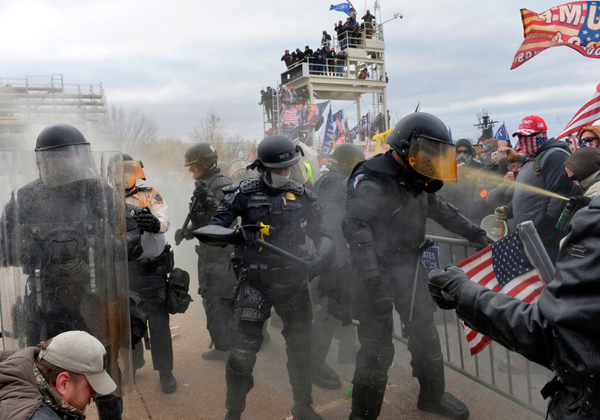Polarization or Radicalization?

This post is a little unusual for CAMPAIGN TRAILS, but we’re heading into a long holiday weekend, so … why not.
This morning I woke up to an email from a columnist at a major newspaper, asking for my input on a topic they were considering for an upcoming piece about “a phenomenon that could be a consequence of polarization: that both the left and right are increasingly driven internally towards self-destructive policies.”
The email then offered some examples of the parties engaging in unpopular measures, and I was struck at how wildly asymmetric they were — Trump, congressional Republicans and a conservative Supreme Court trashing institutions left and right, compared to campus protests, DEI policies, and transgender rights.
I wound up giving a long answer that expressed some half-baked thoughts I’ve had about “polarization” — a concept that once loomed large in academia and still holds sway in Washington, basically arguing that, yes, both sides have moved to the fringes in fairly equal measure — as well as the current state of politics.
Anyway:
I should start by saying that while I used to use the polarization framework myself I’ve come to feel it’s inadequate for describing our current state. For a while, I added the modifier “asymmetric” to the term, as the right seemed to be steadily outracing the left, but as their race to the right has far outpaced anything on the left, I’ve abandoned “polarization” altogether for a frame that stresses the truly important development of right wing radicalization. (Think of their roles in Congress, for instance: Matt Gaetz toppled a speaker and the Freedom Caucus sets the pace, while AOC or “the Squad” have no comparable role or influence.)
The issues you list in the email seem good evidence of that. The top leadership of the GOP — Trump, Congress and even the Supreme Court — are engaged in a radical rejection of democratic norms. Republican senators have been refusing to commit to accepting the election results, as the party rehabilitates the January 6th coup attempt. Republicans including the House Speaker have been showing up at Trump’s trials, attacking the rule of law. Their appointees as judges are facing unprecedented ethics charges while overturning long accepted and popular court precedents. And not to be overlooked GOP legislatures are passing deeply unpopular laws on abortion, birth control, LGBT rights etc.
All of these developments show a party moving not just to the fringes of our current system, but racing towards an outright *rejection* of that entire system. There is a concerted push towards an authoritarian system propped up by minority rule. (I never dreamed it could happen but this Supreme Court could well overturn Baker v Carr or Brown v Board at this point. Griswold, I assume, is already dead in the water.)
On the other side of the ledger, there’s simply nothing comparable from Biden or the congressional leaders in the Democratic Party. Nothing.
The issues you’ve mentioned — campus protests, corporate DEI policies, transgender rights — are almost wholly separate from the party. Indeed, if these issues have any connection to party politics it’s that the *GOP* has pushed them to the forefront in a cynical effort to make the left seem just as menacing as the right. (As someone sitting on a quiet Ivy League campus, reports of our imminent demise have been greatly exaggerated.)
So I’d strongly disagree that the right and left are in comparable positions. Moreover, the idea that they *are* roughly equivalent seems to be a deliberate smokescreen by partisans to hide the real story, which is one of the unprecedented radicalization of the right in service of a minoritarian political project.
I can’t think of any precedent to this moment, at least not in *American* history. The American right was committed to a politics that was similarly hostile to democracy in the 1930s, but they were marginalized. McCarthyism had its moment in the sun, but the GOP was still ideologically diverse with some internal checks. The Reagan-era GOP had some seeds of this but nothing as loud and open.
Where does this lead?
Well, as a historian I’m shy about making predictions about the future, but it seems we’re on a dangerous path to minority rule behind an authoritarian leader. Should Trump win this fall and the GOP control Congress, they’ll further cement the right’s activist judges and seal off chances for changing things back to normal. It will get much much worse and more quickly than many realize.
And that returns me to your question — the Republicans have clearly decided that if their policies are unpopular with voters, the solution isn’t to abandon the policies but just to reduce the voice of voters.
We’ve seen this in states with GOP legislatures when the voters elect a Democratic governor or state Supreme Court majority and the legislature strips those offices of key powers. And the larger rejection of voting rights, scaremongering about non-existing fraud and embrace of gerrymandering only deepens it.
So I’d say the Republican Party isn’t engaged in “self-destructive politics,” but rather a politics which will gladly destroy our democracy in order to secure for a minority policies that are opposed by a majority. And personally, that’s a bit terrifying.
Take care,
Kevin
It’s been a while since we’re had an AMA open thread, so feel free to follow up on this or whatever else in the comments.
And have a great Memorial Day!
Campaign Trails is a reader-supported publication. To receive new posts and support my work, consider becoming a free or paid subscriber.



